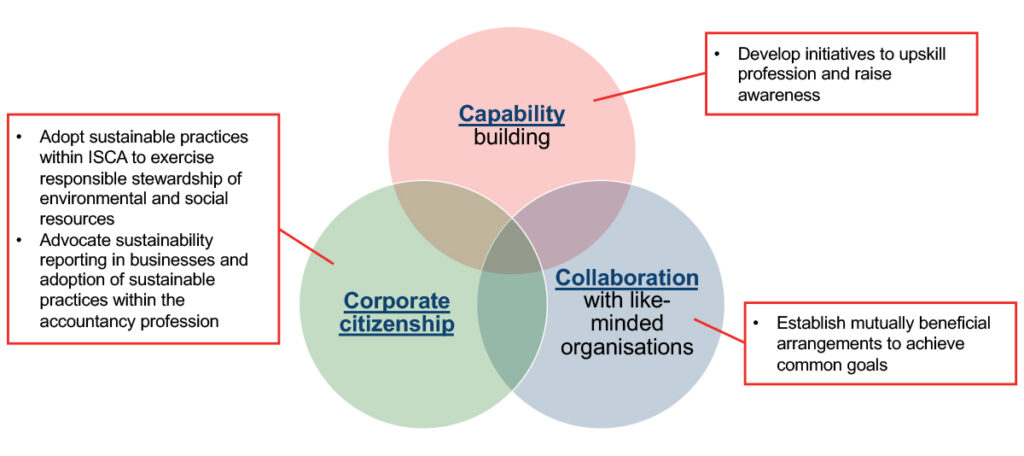BY DONAPHAN BOEY AND TERENCE LAM
ISCA WALKING ALONGSIDE MEMBERS
From the location of our solar system, the size and stability of our sun and our distance from it to the composition of the atmosphere, it takes a very precise set of conditions to maintain life on this planet we call home. Greenhouse gases in the atmosphere absorb some of the energy from the sun and warm the earth just enough for life to be viable on earth. An excess of greenhouse gases in the atmosphere, however, increases temperatures beyond viable thresholds, causing profound effect on the climate, sea levels, weather patterns, ecosystems, living environments and more.
Therefore, with the gravity of the potential impact in mind, it is alarming to watch how the fragile and delicate balance in our atmosphere is under threat by human activities. More than ever in this globalised and interconnected world, no one is shielded from the adverse effect of climate change.
Take agricultural products, for example. Droughts and floods arising from changing weather patterns and other extreme weather events affect crop yield and livestock growth at source. Reduced harvests lower exports from food producers, while more frequent storms and flooding slow the logistics and transportation of agricultural products from source to destination, be it by land, air or sea, or even disrupt supply chains entirely.
The consequences of climate change are not a foreign concept distant from Singapore’s shores. In December 2021, heavy floods in neighbouring Johor displaced thousands of residents and damaged crops. The period of two to three weeks of warm and dry weather that immediately followed in January 2022, which typically falls within the northeast monsoon season, killed even more crops. The combination of these extreme weather conditions decimated produce like cucumbers, chillies, okra and durians. As a result of this supply shortage, the prices of exports to Singapore increased.
The example above gives a glimpse into our small island-state’s vulnerability to climate change as a matter of survival. In addition to the physical risks of climate change, vendor requirements, consumer advocacy and preferences such as plant-based diets, and societal issues add to the list of considerations that should concern all businesses, not just those in the agriculture sector.
Societal issues must also not be neglected by businesses. Whether or not “The Great Resignation” is a fad, it cannot be denied that the modern workforce is placing increasing value on diversity, equity and inclusion in the workplace. If these matters are not adequately addressed, they could lead to significant talent drain from both the country and company, especially when the pandemic has hastened trends for remote work and cross-border employment to make it easier to find work abroad.
In the face of the significant risks arising from sustainability concerns, companies must carefully examine how their business strategy, operations and reporting are affected by environmental, social and governance (ESG) factors, not least because the same risks can be converted into opportunities instead, with strategic forward planning. In the agriculture sector for example, with the onset of less predictable weather patterns, companies can leverage technologies like precision agriculture and vertical farming to build resilience and maximise both crop yield and quality.
Introducing sustainability thinking as an integral part of the business may seem daunting to many. Against a long list of priorities and competing demands, including those not immediately related to sustainability such as digitalisation or profitability, it can be difficult for companies to even pinpoint a starting point, let alone deliver and report meaningful results in sustainability performance. We hope this article will assuage some of their doubts and encourage them to embark on the sustainability journey – sooner rather than later.
SUSTAINABILITY IS A JOURNEY
As the saying goes, a journey of a thousand miles begins with a single step. This applies not only to companies but to their stakeholders, such as regulators, investors and financial institutions. Given the relative nascence of sustainability reporting and the wide-ranging nature of sustainability topics, they present unique opportunities for companies and their stakeholders to engage and learn from each other and progress together in advancing their respective sustainability agendas.
In 2016, the Singapore Exchange (SGX) mandated sustainability reporting for listed companies on a “comply or explain” basis from financial year ended on or after 31 December 2017.
By end-2020, according to the Sustainability Reporting Review 2021 by SGX and the National University of Singapore’s Centre for Governance and Sustainability, 566 of 569 listed companies had released their sustainability reports. The same study observed largely heartening progress made in the sustainability reporting of listed companies since the previous study in 2019.
SGX, after a public consultation in 2021, bolstered the listing rules pertaining to sustainability reporting by introducing a roadmap for listed companies to provide climate-related disclosures. Climate reporting based on the recommendations of the Task Force on Climate-related Financial Disclosures (TCFD Recommendations) will be required on a “comply or explain” basis from financial year commencing in 2022, and will be mandatory for certain sectors from financial years commencing 2023 and 2024, as applicable.
The sustainability journeys of SGX and the companies listed on it are evidently intertwined. The bold first step of SGX back in 2016 kickstarted the development of sustainability reporting by listed companies and together, they continue to cover significant ground in sustainable practices and sustainability reporting in the following years.
Likewise, ISCA’s own sustainability journey is dynamic and seeks to always position accountants at the forefront of global sustainability developments and elevate their role in driving sustainability within their organisations. For example, when SGX issued new listing rules for mandatory sustainability reporting in 2016, ISCA issued the Sustainability Reporting Implementation Roadmap and ISCA Sustainability Roundtable Report – Chief Financial Officers for Sustainability Reporting, via the then-Corporate Reporting Committee (CRC), which in combination provided clarity over how Chief Financial Officers can spearhead sustainability and how organisations can kickstart their sustainability reporting journeys. Since then, the global sustainability movement has grown in prominence, and ISCA recognises that building awareness for sustainability reporting is no longer adequate. This is reflected in the renaming of the CRC to the Sustainability and Climate Change Committee (SCCC), which better describes its renewed purpose and planned initiatives.
As more companies look to mature in their sustainability reporting, ISCA, as the national accountancy body, will also look both outward and inward to rechart the way forward, in order to lead by example and continue to influence positive change in the ecosystem. For this purpose, the ISCA Sustainability Strategy was formulated to institutionalise sustainability as a strategic focus and guide the path ahead.
ISCA SUSTAINABILITY STRATEGY
The ISCA Sustainability Strategy comprises three Cs: corporate citizenship, capability building, and collaboration with like-minded organisations (Figure 1).
Figure 1 ISCA Sustainability Strategy














